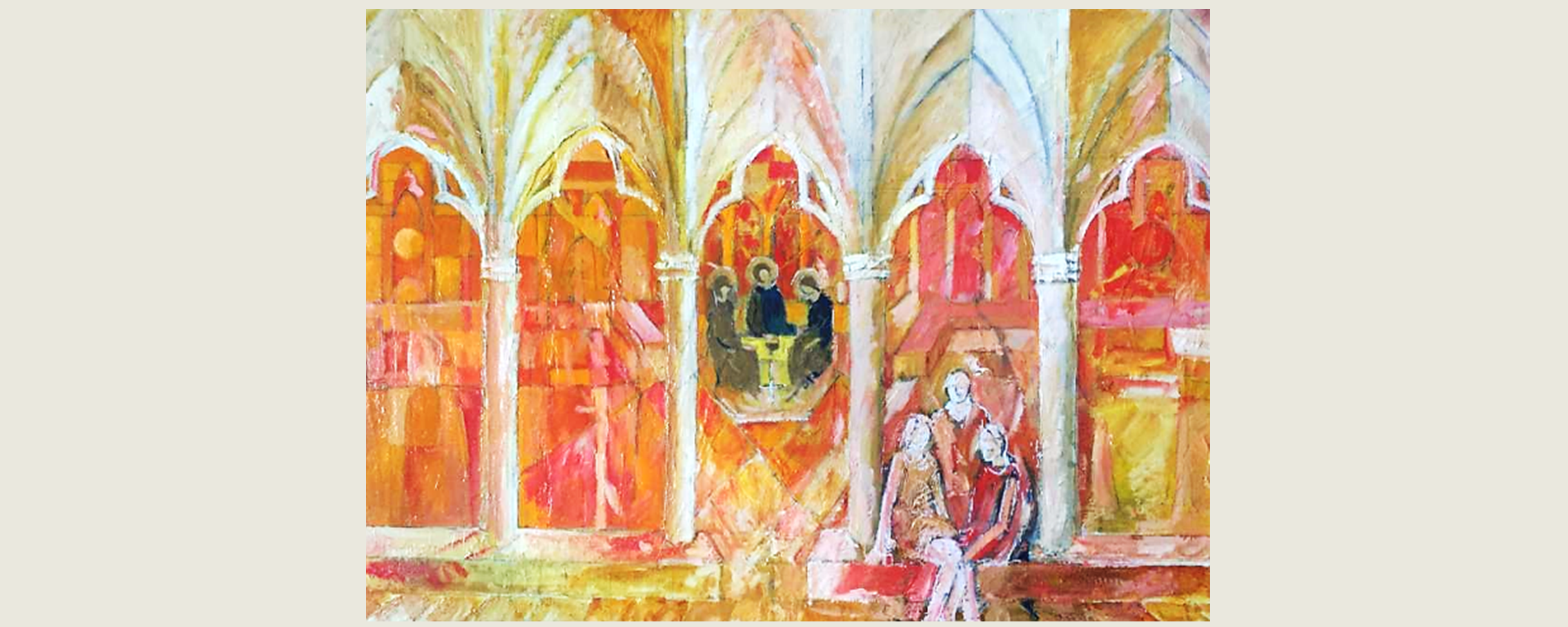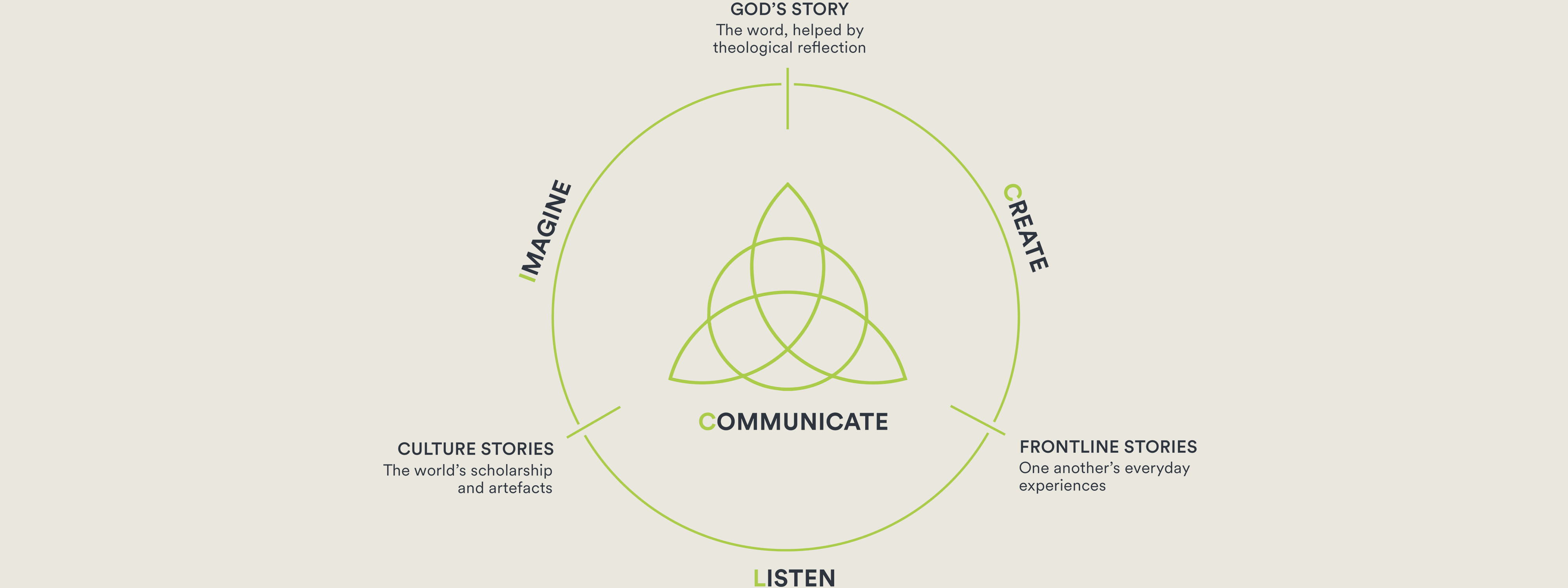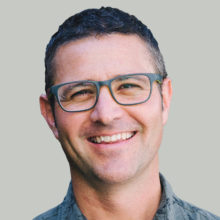
Wise peacemakers | How to love your culture by triple listening (1/5)
I am sending you out like sheep among wolves.
Therefore, be as shrewd as snakes and as innocent as doves.
– Matthew 10:16
Wise Doves
Being a ‘wise dove’ was prized in the ancient church as the best witness to a bemused pagan world. For example, the 3rd-Century discipleship manual Didascalia Apostolorum (The Teaching of the Apostles) was designed to help reform pagans who committed to follow the way of Jesus but were now facing persecution for this costly decision. It gives us a picture of real Christians dedicating their everyday actions to Christ, imitating his teaching with patience. They were commended as being ‘like wise doves, at peace with one another, striving to fill the church’.[1]
Surprisingly, the ancient Roman world shares much in common with our post-Christendom context – where those outside the church are confused about what we really believe, and prone to dismiss our cultural influence as dangerous. So, in the same way, we’ll practise how to be these snake–doves like in Matthew 10:16, these ‘wise peacemakers’ in head, heart, and hands – in the way we think, in what we love, and how we act. These pieces will equip you to understand the signs of the times right where you’re called to be, with the character and skill to work for shalom, showing that Jesus is Lord in every area of life.
This series of five long reads uses the framework we use to engage with culture at LICC, including in our weekly Connecting with Culture articles. It’s a toolkit, we hope, to help you connect with the culture on your own frontline. Together, we’ll learn how to listen, imagine, create, and communicate as whole-life disciples in this confusing time and place, where God is pleased to dwell.
Where and when does God dwell today?
‘Surely God is in this place, though I was not aware of it.’
– Gen 28:16
Like Jacob at Bethel, we need grace to pay attention.
Genesis 28 tells one of my favourite Bible stories. It’s full of intrigue and skulduggery, as this mummy’s boy tricks his blind dad, Isaac, and steals the blessing from his older brother, Esau. He’s old enough to get married, but has a lot of growing up to do before he could truly be a channel of God’s love to those beyond his elect family of Abraham’s descendants. So his mum, Rebekah, sends him back to her clan in Paddan Aram to find a wife. Picture Jacob, fleeing his brother’s wrath, and wandering the wilderness in search of a call to give him direction in his chaos.
With divine irony as only the Bible can deliver, Jacob happens to be in ‘no place’ (v11) with no particular name, resting his weary head on the nearest stone as a pillow. Perhaps this is how we feel, at times, in no-man’s-land, wondering when something spectacular will happen to call us away from our seemingly mundane lives. And yet, right there – in ‘no place’ – he sees the stairway to heaven. Like Adam and Eve in Eden, wandering as royal priests with God in a garden temple, he hears his Creator’s call and commission to cultivate the world, spreading out and blessing everywhere he steps.
God’s grace helped Jacob pay attention, giving him eyes to see this place afresh, and ears to hear his mission to work and walk with his heavenly Father’s blessing. In the Hebrew sense, noticing and ‘naming’ is the heart of wisdom – being able to ‘read and live the patterns of life well’.[2] It’s the process of understanding the essence of something, and having authority to work with it for good ends. In this way, Jacob’s journey to becoming Israel, one who wrestled with God and could rightly ‘name’ what was going on around him, began with astonishment that ‘no place’ was actually an ‘awesome place’, if only he became aware. ‘This is none other than the house of God [Beth-El]; this is the gate of heaven’ (v17). He builds an altar in the wilderness, vowing to give his all to this cause.
As we explore in LICC’s Frontline Sundays, God is calling us to make a difference, whatever we do, wherever we are, whoever we are. Yes, right where you live and learn, shop and serve, work and play, Emmanuel is at work, making his home with us. Right where you are is Beth-El! God’s presence dances on the space–time stage he created; the sacred is in the secular, where you least expected. Your ordinary week brims with divine possibility. But sometimes we need help to reflect on what’s going on around us, so we might respond maturely as we partner with God to transform the wilderness into a worshipful place.
Take the time to slow down, even to dream, as you meet God in your everyday. As we listen and imagine on our ordinary frontlines, we reflect on what’s happening around us and – with God’s help – receive biblical wisdom for what should be going on. As we create new practices, the Spirit renews the way we think and feel, pointing us outwards to create kingdom change. We’re able to respond with maturity to frontline situations and communicate good news to our neighbours.
When we go to our ordinary places ‘in the name of Jesus’, they are transformed to become touching points between heaven and earth. We, too, can know God’s presence, for as Matthew Henry said, ‘No place excludes divine visits.’
But how can we each make sense of our own frontlines, and ‘the way we do things around here’? How do we find Bethel in our particular time and place, with all its peculiarities? What skills do we need, and what process should we follow, to cultivate the spaces we inhabit, so they become places where God is pleased to dwell? Moulding the culture around us really matters. Being fruitful requires us to understand the soil on which we stand.

Triple listening
‘One of the most important – and much neglected – ingredients of Christian discipleship is the cultivation of a listening ear. Bad listeners do not make good disciples.’
– John Stott[3]
How, then, can we wake up to see God at work, right where we are? Francis Schaeffer’s ‘55–5 rule’ is a great start: ‘If I have only an hour with someone, I will spend the first 55 minutes asking questions and finding out what is troubling their heart and mind, and then in the last 5 minutes I will share something of the truth.’
Or take our founder John Stott’s plea for ‘double listening’. As he put it, ‘every true disciple is a listener’. It can be painful, but we must ‘listen carefully … both to the ancient Word and to the modern world, in order to relate the one to the other with a combination of fidelity and sensitivity’. How do you do that in your everyday life? How can we be lovingly present to our neighbours’ hurts, hopes, and longings, yet also lovingly disruptive, looking like our unpredictable Saviour who challenged the status quo and lifted up the downtrodden?
Truth be told, Stott actually practised triple listening, and we should too.[4] We’re called to listen to the cries of the world, through the wisdom of the Word, for one another to flourish on our frontlines as whole-life witnesses. These three sources must be in constant dialogue, travelling together and joining the divine conversation by which Father, Son, and Spirit brought creation into being (Genesis 1:1–3; John 1:1–5).
Figure 1. Lindsay Farrell, ‘He is not here! The risen Christ: Cluny, the Taizé Icon, and the Cloister’. Oil Painting, 2014.

This beautiful painting by my mentor and friend, the artist and church historian Lindsay Farrell, captures this dialogue well. It depicts part of the Camino walk that his wife, Ann, and my wife Nikki and I experienced together in France, prayerfully wandering between the abbeys of Cluny and Charlieu.
We began at Taizé, an ecumenical community in the ancient monastic tradition, where hospitality is extended to all as they share life, serve their neighbours, and dwell in prayer, song, and silence.
Their gathering space is themed around the 15th-Century Russian icon of the Trinity by Andrei Rublev. It depicts the Lord’s visit to Abraham and Sarah (Genesis 18:1–8), promising new life out of a barren womb. As this couple made space at the table to eat together, the three-in-one visitor made space in their loving community for our parents in the faith to find a home. In turn, God sent Abraham and Sarah out – the first steps foreshadowing a covenant people, Israel, on mission with their Saviour – bearing hope to feed a hungry world. Father-Son-Spirit our three-in-one God, pay attention to each other with humility and love. It’s a divine dance continuing across the ages, inviting us to participate.
In a similar way, the painting depicts how as Ann, Nikki, and I walked and talked with one another, we became part of this eternal triune conversation, surrounded by the great cloud of witnesses from across the ages (outlined under the arches). Together we enjoyed the Eden-like cloisters of Cluny and Charlieu, intimate places where we communed with God. It became a taste of heaven on earth from which we were sent to cultivate wherever our feet step as holy ground. God’s presence goes with us, as we’re sent to demonstrate the kingdom of God in our daily lives.
When we listen to the Word, the world, and one another, we’re drawn into God’s hospitality, and our eyes are opened to discover Bethel directly under our feet. Through this encounter, we’re formed as God’s channel to bless the world (Genesis 12:1–3; 18:1–15).
‘Culture’ is often defined as the stories we tell each other about ourselves, to make sense of who we are and where we’re going as a society. As we converse, swapping stories as we walk and talk and eat together, the meaning of life begins to emerge. Drawing on the painting above and Abraham and Sarah’s experience, however, we see that our barren culture is confused until it’s in step with Father, Son, and Spirit, dining at the same table. We need a larger dialogue in this confusing moment. We need a three-way ‘cultural conversation’.
Joining the cultural conversation
This cultural conversation is characterised by three stories – God’s story, culture’s stories, and frontline stories – weaving in and out of each other, always anchored in God’s Word as bedrock.[5]
Drawing on these three sources, the cultural conversation comprises four stages following the handy acronym L.I.C.C.(!) We’ll explore one stage in this process in each long-form post over this series. No need to be daunted by this overview – just get a feel for the process, and together we’ll start the journey. It will help you make a difference right where you are.
- First, we listen to what is going on around us and why, slowing down to reflect on our personal experiences. We then place these experiences within the larger cultural story as seen in scholarship and artefacts like movies, technology, fashion, and more.[6]
- Second, we imagine what should be going on around us as part of God’s big story – from creation to consummation, centred on his mission to save the world through Christ, which climaxes at the cross. We make space to receive biblical wisdom for what this could look like on our frontlines.
- Third, we create a new story, acting faithfully in response to the needs in front of us in a way that brings shalom. Fresh spiritual practices open us up to God’s renewal of our thinking and emotions. And as we seek fruitfulness in our relationship with God, neighbour, nature, and self, we serve up a taste of heaven in the here and now.
- Fourth, as the kingdom comes near, we communicate that Christ is king in a way which connects with people on our frontlines, responding sensitively to their situations. We contextualise the gospel for the places we’re in.
This framework will help us grow as disciples on our frontlines, into the sort of people who are able to respond in this Christlike way, through spiritual disciplines tailored to our particular situation.
The diagram below is a helpful guide. The three-cornered icon for the Trinity reminds us that this cultural conversation must be prayerful, as we participate in the dialogue of Father, Son, and Spirit across the ages. With the Spirit, we listen to one another, reflecting on what’s happening within us. With the Son, we listen to the world he loves and in which he took on flesh, reflecting on what’s going on around us. With the Father, we listen to the word as we receive godly wisdom to imagine what should be and join his work of reshaping culture in line with the kingdom. Then we lovingly respond as mature disciples, communicating the good news as whole-life witnesses.
Figure 2. The Cultural Conversation: The LICC Process

The L.I.C.C. process: wisdom for the Emmaus way
As they talked and discussed these things with each other,
Jesus himself came up and walked along with them.
– Luke 24:15
We see this ‘listen–imagine–create–communicate’ dynamic in Luke 24 as the resurrected Jesus journeys with Cleopas and companion on the way to Emmaus. Unrecognised, he draws near and listens well, asking wise questions to unearth their personal story of pain, and confusing cultural tale of what they wanted their deliverer to do; they expected a warrior king, not a suffering servant, so they were understandably disoriented. Subtly, the Christ draws them into a larger story, retelling the mission of God, helping them reimagine where God is at work. But it’s not until they practise the eucharist prayerfully in Jesus’ presence that their eyes are opened, and their feet are redirected to head back to Jerusalem in healing action. Time to communicate the good news that Christ is risen, and that nothing will ever be the same again![7]
In the same way, our journey to frontline mission is captured by the L.I.C.C. process: Listen, Imagine, Create, and Communicate. It’s how we become culturally astute whole-life disciples.
In this first long-form series, we’ll practise how to do this as ‘wise peacemakers’ who can make sense of the signs of the times on our very streets. We’ll work for shalom that points people to Jesus as the Prince of Peace. For part 2, we will learn how to truly listen.
In the meantime, why not catch up with a friend to share what spoke to you in this piece? Pray together for fresh eyes to see your everyday place become Bethel – a portal where heaven meets earth – and encounter with God leads to blessing the nations, starting with neighbours right where you are.
May God bless you as you seek wisdom for the way to shalom, making a difference in your particular time and place. For Emmanuel, our God ever at work, longs to make his home with us, if only we have eyes to see and ears to hear.
Dave Benson
Director of Culture & Discipleship
LICC
[1] See Alan Kreider, The Patient Ferment of the Early Church: The Improbable Rise of Christianity in the Roman Empire (Grand Rapids, MI: Baker Academic, 2016), 223–242.
[2] Mark Strom, Lead with Wisdom: How Wisdom Transforms Good Leaders into Great Leaders (Milton, Qld: John Wiley & Sons Australia, Ltd., 2014). See also Matthew 16:2–3 and Proverbs 1:1–7.
[3] See John Stott, The Contemporary Christian: An Urgent Plea for Double Listening (Nottingham, UK: Inter-Varsity Press, 1992), 101. On ‘double listening’, see pages 12–13, 24–29.
[4] See Stott, ‘The Listening Ear’, chapter 6 in The Contemporary Christian, 101–113, with its three-fold structure of listening to God and the world, meeting in the middle as we listen to one another.
[5] See the work of philosophical theologian, John M. Frame, Theology in Three Dimensions (Phillipsburg, NJ: P&R Publishing, 2017), and his exploration of ‘tri-perspectivalism’ here.
[6] I’ll explain ‘cultural artefacts’ in the next long-read. For now, just know it’s social sciences language for anything created by humans which offers insight into the culture of its maker and users. Think movies, technology, fashion, and more. Bundled together, these artefacts offer a collection of stories we tell each other about ourselves – what we ‘make’ of the world in meaning.
[7] For how this story offers a model for mission in post-Christendom, see David Smith, Moving Towards Emmaus: Hope in a Time of Uncertainty (London: SPCK, 2007).



I watched a Blackbird on the grass. It stopped hopping, listened, then took its food from the earth.
I need to stop, listen and gain the prize God is offering me. this course is helping me.
“Francis Schaeffer’s ‘55–5 rule’ is a great start.” This has taught me that I have to be intentional to listen as much as I would love to speak